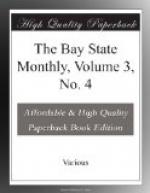* * * * *
THE FIRST NEW ENGLAND WITCH.
By Willard H. Morse, M.D.
At the beginning of the seventeenth century, in an English country district, two lads romped on the same lea and chased the same butterflies. One was a little brown-eyed boy, with red cheeks, fine round form, and fiery temper. The other was a gentle child, tall, lithe, and blonde. The one was the son of a man of wealth and a noble lady, and carried his captive butterflies to a mansion-house, and kept them in a crystal case. The other ran from the fields to a farm-house, and thought of the lea as a grain field. It might have been the year 1606, when the two were called in from their play-ground, and sent to school, thus to begin life. The farmer’s boy went to a common school, and his brown-eyed play-mate entered a grammar school. From that time their paths were far apart.
The name of the tall, blonde boy was Samuel Morse. At fifteen he left school to help his father on the home farm. At twenty he had become second tenant on a Wiltshire holding, and began to be a prosperous farmer. Before he had attained the age of forty he was the father of a large family of children, among them five sons, whose names were Samuel, William, Robert, John, and Anthony. William, Robert, and Anthony ultimately emigrated to America, while Samuel, Jr., and John remained in England. Young Samuel went to London, and became a merchant and a miser. When past his fiftieth year he married. His wife died four years later, leaving a baby daughter and a son. Both children were sent up to Marlboro, where they had a home with their Uncle John, who was living on the old farm. There they grew up, and became the heirs both of John and their father. The boy was named Morgan. He received a finished education, embraced the law, and married. His only child and daughter, Mary, became the heiress of her aunt’s property and her great-uncle John’s estate, and was accounted a lady of wealth, station, and beauty.
Meanwhile, the family of old Samuel Morse’s playfellow had also reached the fourth generation. The name of that playfellow was Oliver Cromwell, who became Lord Protector of the British Commonwealth. Of course he forgot Samuel Morse, and was sitting in Parliament when Samuel died. He had children and grandchildren who lived as contemporaries of his old playmate’s children and grandchildren. Two or three years before Samuel’s great granddaughter, Mary, was born, a great grandson of the Protector saw the light. This boy was named Oliver, but was called “Rummy Noll.” The ancestral estate of Theodale’s became his sole inheritance, and as soon as he came into the property he began to live a wild, fast life, distinguishing himself as an adventurous, if not profligate gentleman.




